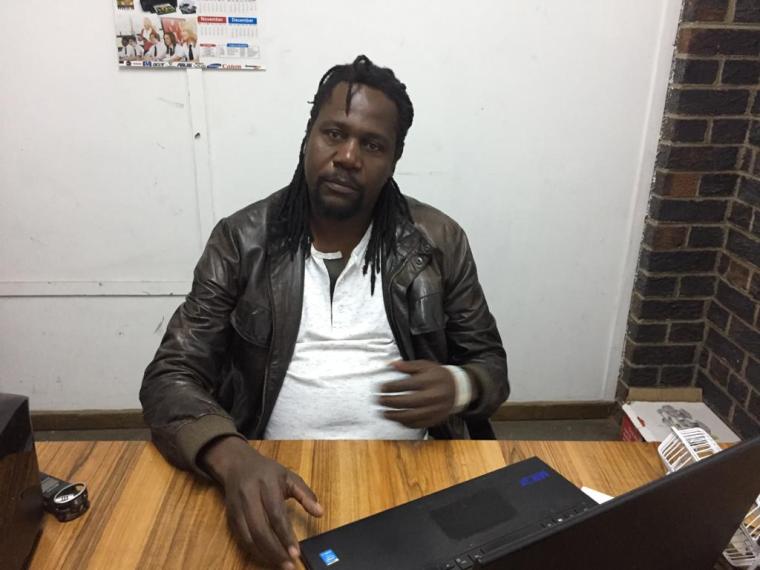On June 29, 2020, Godfrey Mtimba, a freelance journalist in Zimbabwe’s southern town of Masvingo, was charged with insulting and undermining the authority of President Emmerson Mnangagwa, the journalist and his lawyer, Phillip Shumba, told CPJ via messaging app.
Mtimba was charged under Section 33 (2) (a) of the Criminal Law (Codification and Reform) Act, according to Shumba and a statement by the Zimbabwean chapter of the regional press freedom group, the Media Institute of Southern Africa.
The offense is punishable by one year in jail or a fine of up to Z$4,800 (US$13.26) or both, according to the law and the Criminal Law Codification and Reform (Standard Scale of Fines) Notice, 2020.
Masvingo police spokesperson Charity Mazula, speaking to CPJ via messaging app, disputed that Mtimba was charged, but did not reply to follow up questions seeking clarity after the journalist and Shumba told CPJ this was incorrect. CPJ was unable to access a copy of the charge sheet, but reviewed an audio recording provided by Mtimba of a person he said was a police officer reading off the charge.
On June 26, Mtimba, a freelance correspondent for the U.S. Congress-funded Voice of America’s Studio 7 program in Zimbabwe, among other outlets, was reporting on a vehicle chase in which police officers were pursuing opposition youth leaders, the journalist told CPJ. Mtimba said the youth abandoned their car and fled on foot into the high-density Mucheke suburb of Masvingo. He began taking photographs and video of the chase but uniformed police officers questioned him about his press card and then ordered him to leave, Mtimba said.
“I was just doing my job,” Mtimba told CPJ.
Mtimba said he received a call the next day from the police to report to the local police station to answer questions about why he had taken photographs of opposition youth leaders talking to residents waiting to board a bus the previous day.
At Mtimba’s questioning on June 29, Shumba, who accompanied the journalist to the police station, said that he told the police that filming and recording was part of Mtimba’s job as a journalist. Shumba said that the police then changed the reason that they were questioning Mtimba, alleging that the journalist had “connived” with opposition activists who had told commuters that the president and his sons were stealing public funds. The police then charged Mtimba, he said. According to news outlet New Zimbabwe, one of the youth leaders, Ephraim Mutombeni, was arrested on June 28 and charged with undermining and insulting the president. He has since been released on bail, the article said.
A person can be charged with undermining or insulting the Zimbabwean president “if they publicly make a statement (by words, by an act or by a gesture) that will: engender feelings of hostility towards, or, cause hatred, contempt or ridicule of; the person or office of the President or Acting President of Zimbabwe,” according to the Criminal Law (Codification and Reform) Act, and a MISA Zimbabwe fact sheet on crimes against the state.
Masvingo police spokesperson Charity Mazula told CPJ via messaging app on July 1 that police had not charged Mtimba as he was not a suspect, but had simply questioned him as a witness to the June 26 incident in which activists allegedly told commuters that the president and his sons were stealing public funds.
Both Mtimba and Shumba disputed this, saying Mtimba was charged and released into Shumba’s custody pending his court appearance at a date yet to be determined.
Mtimba provided CPJ with an audio recording he had made at the police station of someone reading out the charges. Although the quality of the recording is poor, a person Mtimba identified as a police officer speaking in English and Shona, can be heard describing the charge of undermining the authority of the president.
Mtimba said he had to sign three copies of a charge sheet, and that the police refused to give him a copy. Shumba said that the police also declined to provide him with a copy, saying that Shumba could get it from the court when the journalist appeared before it. Mtimba was kept under guard at the police station on from 8 a.m. to 1 p.m. on the day of his questioning, said Shumba.
“Is that how witnesses are treated? Is there any basis for keeping a witness that long? Why prefer charges against a witness? It is unheard of, ” said Shumba
Neither Mtimba nor Shumba have received official notification that the charges were dropped, they told CPJ.
Mazula did not respond to a follow-up phone call or requests via messaging app for clarity on why she claimed Mtimba was called for questioning as a potential witness and was not a suspect, when Mtimba and his lawyer told CPJ that he had been charged.
Mtimba, who is also the vice president of the Zimbabwe Union of Journalists, told CPJ that although police appeared to be backtracking, he remained worried about his safety, adding that he had noticed what he described as suspicious vehicles outside his home at night and that people were following him.
